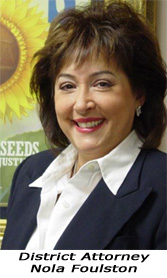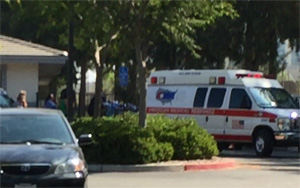Judge may determine if reporting is mandatory or discretionary
By Cheryl Sullenger
Wichita, KS — The State of Kansas presented a defense this week in a Federal case brought by abortionists and social workers in a dispute over the state’s mandatory child sex abuse reporting law. The case, Aid for Women, v. Foulston, is set to conclude today with a decision expected to be rendered by Judge J. Thomas Marten as soon as the trial ends.
At issue is a 2003 opinion issued by Attorney General Phill Kline indicating that, according to Kansas statute, sexual activity with a child under the age of 16 is illegal and must be reported. Kansas law sets the legal age of consent at 16.
Kline has repeatedly made statements that his opinion referred only to penetrative sexual acts as defined by law. The case has sparked nation media interest. In a statement on Fox News, Kline indicated that his opinion was simply a reflection of existing Kansas statutes, and if the plaintiffs wanted the mandatory child sex abuse reporting law changed, it should be done through the legislature, not the courts.

The central issue to the case is whether or not mandatory reporters, such as doctors, social workers, and abortion clinics, have the discretion not to report incidents of underage sex, if they believe the conduct was “consensual and non-injurious.”
According to defense witness Nola Foulston, the District Attorney sued in this case, the answer to that question is an unequivocal “no.”
Foulston read the critical passage of the mandatory reporting law to the court, which says, “When any of the following persons has reason to suspect that a child has been injured as a result of physical, mental or emotional abuse or neglect or sexual abuse, the person shall report the matter…”
Foulston testified that the term “injury” in this statute is a legal term, not a medical one, and that those two definitions differed.
She indicated that mandatory reporters are not charged with investigating to determine if an “injury,” in the legal sense, has occurred, but are to report the “suspicion of injury” so law enforcement can conduct the kind of investigations that health care workers are not trained to conduct, in order to make the determination if prosecution is required. Suspicion of injury that would, without question, trigger mandatory reporting would include a pregnancy conceived when the girls was under 16.
Foulston also testified that sexual intercourse with a child under the age of 16 cannot be consensual by law, even if the child was a willing participant. Foulston told the court that she is not interested in information about subsequent care after the injury has occurred, and whether or not a girl receives an abortion is not “need to know” for her office. However, she did testify that she needed every piece of information about the injury in order for her to provide legal protections to the child. Sensitive, private information is protected and not included in public documents, she said.
“Doctors should not substitute their judgment for the law and make their own determination when to report,” she said.
Currently the child protection agency in Kansas, known as SRS, makes the determination whether or not to report underage sexual activity to the District Attorney or to ignore the matter. Abortion clinics have not been reporting.
Foulston expressed surprise to learn of this discretionary policy. “I am not happy,” she later told reporters. “I believe social services has a responsibility to investigate these cases, and you can’t abdicate that with some blanket policy that says we’re going to turn our heads the other way.”
Other witnesses testified to other aspects of the case.
Dr. Allan Josephson testified Monday about the inability of adolescents to make decisions with consideration to long-term consequences because of their immaturity and also the physiology of the brain at that stage of development. Because certain developmental processes are incomplete, adolescents tend to be “risk takers” and think everything will “work out.” Josephson testified that adolescents tend to defer to emotions more than adults, and that affects their reasoning process. He testified that because adolescents are unable to consider the risks of a behavior, as adults can, that sexual conduct in children under 16 is “inherently injurious.”
Josephson’s testimony was treated with hostility by plaintiffs’ attorneys and rigorously questioned by Judge Marten.
Dr. Elisabeth Shadigian testified Tuesday that certain sexual acts were “inherently injurious” and that underage sex hurt girls more than boys. She used baseball analogies to describe various kinds of conduct. She also testified that skin to skin touching body area that are covered by a swimsuit would be inappropriate for under16 adolescents and should be reported.
Dr. Kirk Alexander is a research analyst whose job it is to conduct quantitative analysis of databases on family issues. He presented statistics to the court based on the National Survey of Family and Growth, compiled by the Center for Disease Control, which showed a very strong correlation to underage sexual activity and harmful effects in both boys and girls.
Dr. Alexander testified that those who make their “sexual debut” under 16 years of age have significantly higher rates of out-of-wedlock births, abortions, and sexually transmitted diseases. Girls were likely to have 10 or more sex partners if they began having sex under 16 as opposed to 4.75 partners for girls who began having sex at 16 or older, and were much more likely to divorce by their thirties.
Dr. Alexander also testified that there was a strong correlation between underage sex and depression and suicide attempts. Children who initiated sex prior to age 16 were 2-8 times more likely to attempt suicide if they are sexually active than those who are not. He stated that a full 63% percent of those surveyed who were sexually active as adolescents expressed the wish that they had waited.
The defense witness who had perhaps the hardest time on the stand was Assistant Kansas Attorney General Kevin Graham. The plaintiffs objected to every aspect of his initial testimony and finally the judge told defense attorneys that their questioning of him was not “helpful” and that the only question he wanted answered was what Graham knew about why the Attorney General issued his controversial 2003 opinion “amending application of the law.” After a recess, Graham’s testimony was cut short.
District Attorney Nola Foulston later testified that Kline’s opinion had no effect on her office in the way her office handles underage sex reports.
The trial is scheduled to conclude today and Judge Marten has indicated that he may issue his ruling at the end of the trial’s proceedings.
Read previous article
Read related article

Select Page




